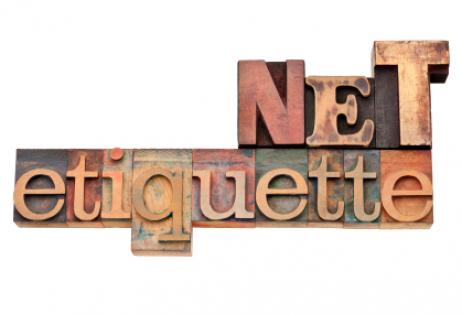There are a few cornerstones to polite social interactions: don't interrupt people when they're speaking, say please and thank you, and always send a written thank-you note.
Yet in today's world of texts, e-mails, Facebook posts and tweets, many of the basic guidelines we try to follow in face-to-face interactions are overlooked.
One of the biggest challenges of written communication such as e-mail and texting is the inability to convey tone or humour. Because people can't see your facial expression or hear the tone in your voice, they can't tell whether you're being sarcastic or serious. Misunderstandings or hurt feelings can arise when you're just kidding.
Research shows that 66% of adults who access the internet use social media such as Facebook, Twitter, MySpace or LinkedIn. Remember, none of these spaces are private places – others are frequently able to see what you post.
Here are some tips to help you mind your e-manners.
- Communicate clearly and to the point. Always re-read what you write before you click send, checking tone, grammar and spelling. Make sure what you've written is similar to what you'd say face-to-face.
- Remember to include the please and thank you that you would have conveyed in person.
- When e-mailing, avoid using abbreviations that you would use when texting, such as LOL or l8r.
- Don't write in all caps or use too many exclamation points. This is perceived as "yelling" within electronic communications.
-
When sending or receiving emails involving multiple parties, follow some simple guidelines:
- when responding to an email, don't click "reply to all". Include only the recipients that need to hear from you.
- when forwarding an email, delete additional email addresses from the attached messages.
- remove any comments in email strings that should be kept private between the parties involved.
- use the BCC field when sending an email to a large number of recipients. They'll thank you for not broadcasting their email addresses to the world.
- Don't post something about others, or publish a photo of them, before checking with them first. You could ruin a relationship or unintentionally embarrass someone.
- Try to keep your posts positive, and avoid posting gossip or anything that is not true. Not only will these types of posts influence the way people perceive you, but they can hurt feelings or come across as bullying. Definitely avoid posting when you're angry or frustrated.
- If you’re with someone, remember that person is vastly more important than the text message you just received. Don't interrupt your conversation with digital distractions.
- When you're talking on the phone in public, be aware of your surroundings and try to keep your voice down. Don't discuss your personal life on your mobile phone in the office, in a restaurant or public transport. Not only does this show consideration for others around you, but it protects your privacy as well. Try to make it brief so you don't disturb others with a lengthy conversation.
- When you're in a crowded environment, don't crank up the sound on your computer game. Either mute the volume or wear solid-fitting earphones so others around you are not disturbed. Just don't forget to remove your earphones when someone is trying to talk to you!
- Lastly, turn off your devices completely when you enter a church, cinema or library. Even vibrate mode can be disturbing to others trying to concentrate.


















__small.png)










